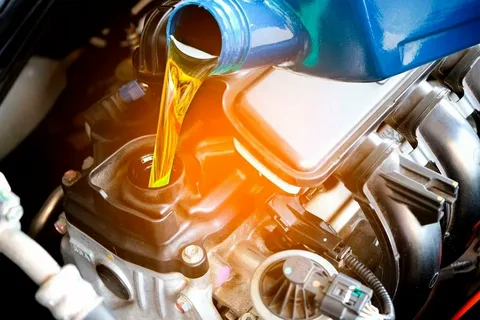Your car is more than just a means of transportation; it’s an investment that requires proper care and maintenance. One of the simplest yet most essential maintenance tasks for any vehicle is a car oil change. Regular oil changes keep your engine lubricated, prevent wear and tear, and extend the life of your vehicle. In this blog, we’ll explore why oil changes are crucial, how to know when your car needs one.
Why Oil Changes Matter
Engine oil is often called the lifeblood of your car, and for good reason. It lubricates moving parts, reduces friction, and helps prevent overheating. Over time, however, oil becomes contaminated with dirt, debris, and combustion byproducts, which can compromise its effectiveness. Neglecting to change your oil can lead to:
- Engine Wear and Damage: Dirty oil loses its lubricating properties, causing engine components to grind against each other.
- Reduced Fuel Efficiency: A poorly lubricated engine must work harder, consuming more fuel.
- Overheating: Oil helps regulate engine temperature, and old or insufficient oil can cause your engine to overheat.
By keeping up with regular car oil changes, you protect your vehicle, maintain performance, and avoid unnecessary repair costs.
Signs Your Car Needs an Oil Change
Most drivers know that oil changes are important, but how do you know when it’s time? Here are some common signs:
- Dashboard Oil Light: Modern vehicles are equipped with an oil warning light that alerts you when oil levels are low or oil quality is poor.
- Unusual Engine Noises: Squeaking, ticking, or knocking sounds can indicate that your engine is not properly lubricated.
- Dark or Dirty Oil: Fresh oil is amber and translucent. If your oil looks dark and murky, it’s time for a change.
- Excessive Exhaust Smoke: Thick or black exhaust smoke can signal old oil that is no longer performing optimally.
- Mileage Intervals: Most vehicles require an oil change every 3,000 to 7,500 miles, depending on the make and model. Always check your owner’s manual for manufacturer recommendations.
Paying attention to these signs ensures that your car receives timely maintenance before small issues escalate into major problems.
Choosing the Right Oil for Your Vehicle
Not all engine oils are created equal. Selecting the right oil type is essential for optimal performance:
- Conventional Oil: Ideal for standard engines and everyday driving.
- Synthetic Oil: Provides superior performance in extreme temperatures and high-performance engines.
- Synthetic Blend: Combines the benefits of conventional and synthetic oils for balanced protection.
- High-Mileage Oil: Formulated for vehicles with over 75,000 miles, helping reduce leaks and engine wear.
The Benefits of Professional Oil Changes
While some car owners attempt DIY oil changes, there are significant advantages to entrusting your vehicle to trained professionals:
- Comprehensive Inspection: Mechanics can identify potential issues beyond oil, such as filter clogs, fluid leaks, or worn-out belts.
- Proper Oil Disposal: Professionals ensure that used oil is disposed of safely and in an environmentally responsible manner.
- Time and Convenience: A professional oil change is fast, efficient, and hassle-free.
- Quality Assurance: Certified technicians guarantee that your car receives the correct oil and filter, minimizing the risk of engine damage.
Regular visits to a trusted service provider not only keep your engine healthy but also help maintain your vehicle’s resale value.
How Often Should You Change Your Oil?
The frequency of oil changes depends on several factors:
- Manufacturer Recommendations: Always refer to your vehicle’s owner’s manual.
- Driving Conditions: Frequent stop-and-go traffic, short trips, or extreme temperatures can shorten oil life.
- Oil Type: Synthetic oils typically last longer than conventional oils.
A good rule of thumb is to schedule an oil change every 5,000 miles or every six months, whichever comes first. However, consulting a professional at Empire Auto in Holliston ensures your vehicle’s specific needs are met accurately.
Tips for Maintaining Engine Health
In addition to regular oil changes, consider the following tips for keeping your car in top condition:
- Check Other Fluids Regularly: Transmission fluid, brake fluid, and coolant levels are all critical.
- Replace Air Filters: Clean filters improve engine efficiency and reduce wear.
- Monitor Tire Health: Properly inflated and aligned tires reduce strain on the engine.
- Listen to Your Car: Unusual sounds or vibrations are early warning signs that shouldn’t be ignored.
- Follow a Maintenance Schedule: Preventive care saves time, money, and stress in the long run.
Conclusion
A car oil change may seem like a simple task, but it plays a crucial role in the longevity and performance of your vehicle. Ignoring oil maintenance can lead to costly repairs, reduced fuel efficiency, and engine damage. By paying attention to signs of oil degradation, using the right type of oil, and relying on professional service providers, you can ensure your car continues running smoothly for years to come.
For drivers in Holliston, MA, Empire Automotive Group offers reliable, professional care for all automotive needs. From routine oil changes to comprehensive inspections and repairs, their experienced team ensures that every vehicle receives the attention it deserves. Combined with their extensive inventory of quality used cars, Empire Auto in Holliston is the ultimate destination for automotive solutions.

